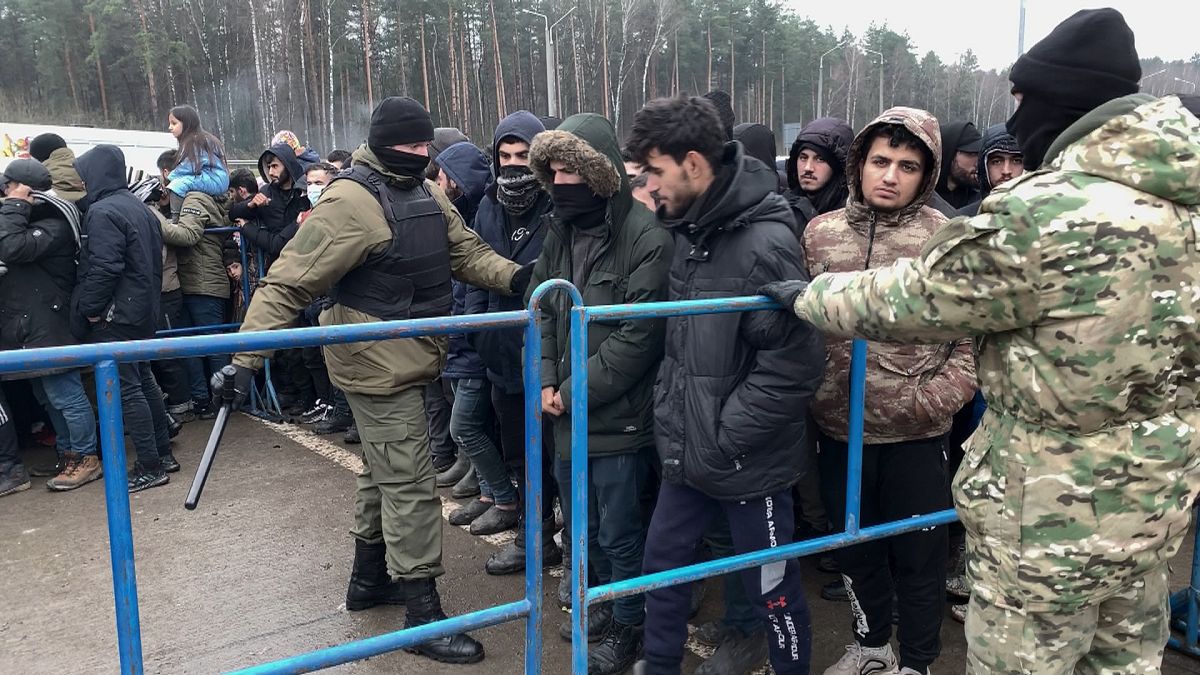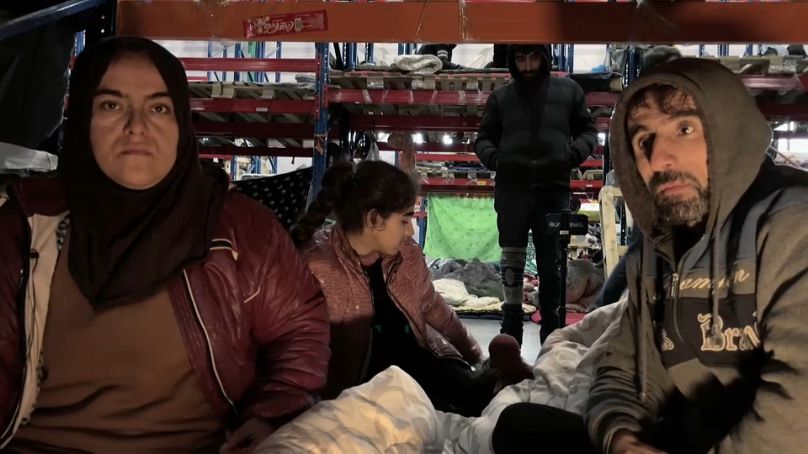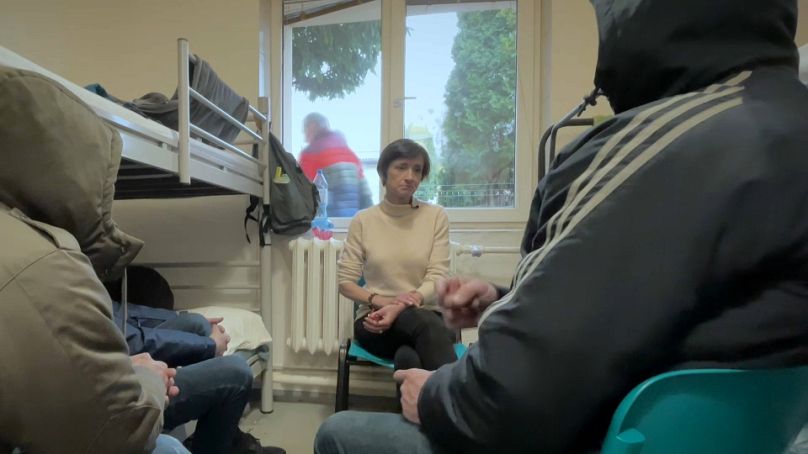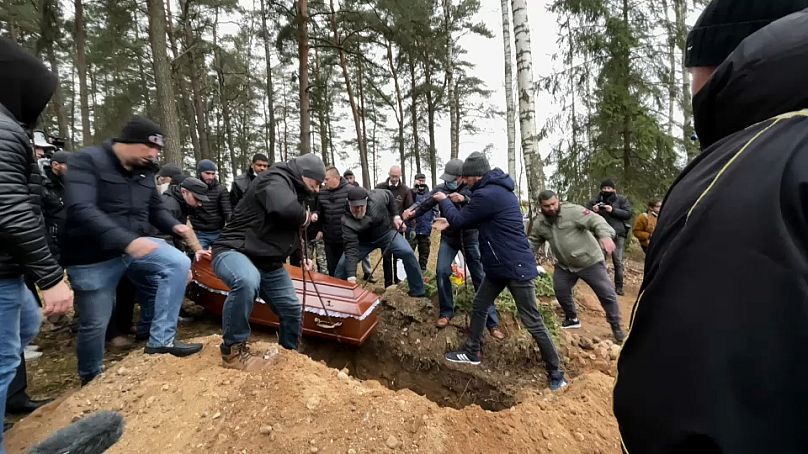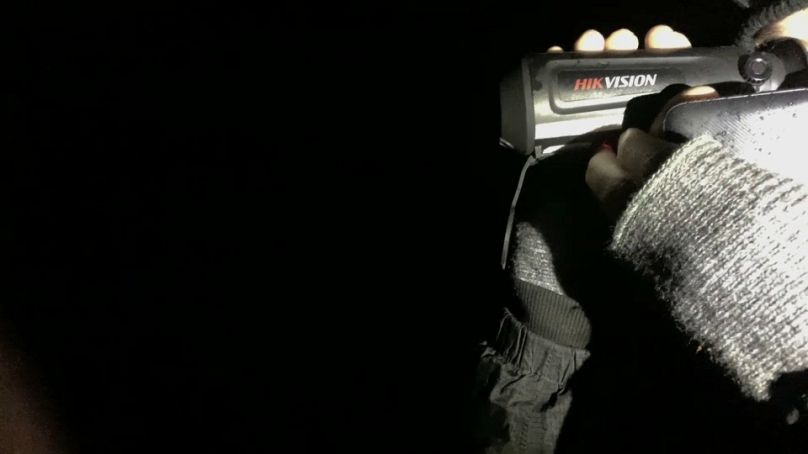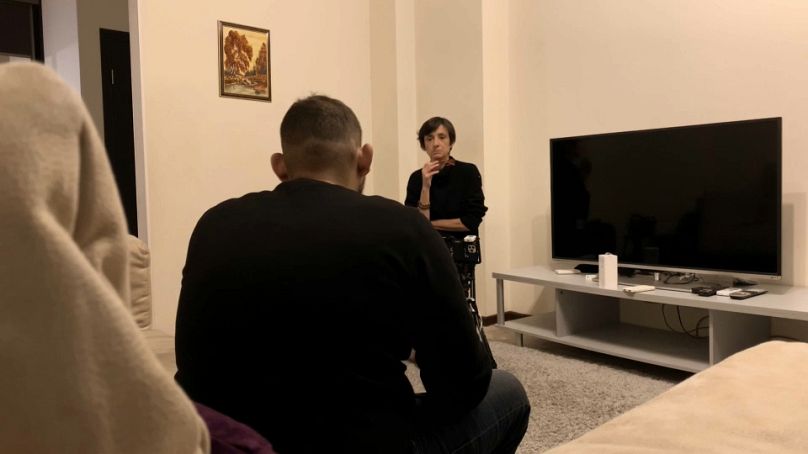In this Witness, Euronews Valerie Gauriat reports from the border between Poland and Belarus, meeting the migrants stuck in a geo-political standoff between Minsk, Warsaw and the rest of the EU.
When the Poland Belarus border crisis first broke out this summer, I remember comments from fellow journalists saying that it would all probably blow over by autumn.
I have reported twice in the area since then, and despite ongoing diplomatic moves, thousands of migrants are still caught in the standoff between Minsk and the European Union.
On my second visit, I was able to spend a little time on the Belarus side of the border, which had been opened up to the media.
Moved to a warehouse
Authorities were eager to show that there had been improvements, and that hundreds of people stranded outside for weeks in makeshift camps had been given shelter from the cold - in a huge warehouse just off the road to the Bruzgi border crossing with Poland.
I couldn’t help gasp, when I entered the building. It was packed with men, women, and so many children, stacked like cattle, scrambling along aisles, killing time on mattresses piled up on the warehouse's shelves or on the floor. I felt as if I had just entered a giant exhibition of human misery. The clamour. The stench. My interpreter had to take a breath outside before we continued.
The authorities in Belarus had just started organising access to medical care and hygiene facilities, but conditions were dire.
That was not the biggest concern of the dwellers. “We sold everything to come here in order to reach Europe. But Europe refuses to open its doors to us. My family and I are ready to stay here another 3 months, until European governments react”, said Vian, a Kurdish woman from Iraq.
The determination in her eyes, intense with the shadow of what she told me she and her family had endured in the northern Iraqi city of Kirkuk, under attack from Daesh.
A young man suddenly appeared from nowhere; a press officer from the Belarusian Foreign Affairs Ministry, informing me that the Governor of the Grodno region was outside, available for interviews. I made my my way along lines of people queuing to get food, under the watchful eye of soldiers. The look of the silent men queuing, was one of humiliation, as the soldiers batons touched their chests, ever so slightly.
"The solution to this humanitarian crisis does not depend on us,” insisted the Governor of the region. “If people want to go back to their country, we make it possible. But most of them say they wish to continue their journey, which is something unfortunately we cannot offer them.
"It is a political issue, and the decision must be taken by the leaders of the European Union. We hope that the position of the European Union will be defined soon, because people are tired.”
A geo-political chess game, with migrants being used as pawns.
Tensions rise in escalating crisis
On the other side of the border, in the Podlasie region of Poland, tensions have risen since my first visit. Some 15,000 police, border guards, and soldiers have been deployed along the border.
Checkpoints are everywhere, and police and military convoys scour the roads as if they were part of a grim ballet.
The 3 km-wide exclusion zone that runs from the border with Belarus is still blocked to non-residents, humanitarian organisations, and journalists.
Local activists keep sounding the alarm. Arbitrary pushbacks of migrants who make it to Poland, by security forces, are ongoing. And those forced to go back to Belarus, are in turn pushed back by the Belarusian soldiers.
"We ran from the war, and came to the forest to die."
Claims that the authorities in Belarus have repeatedly rejected, although Belarusian President Alexander Lukashenko himself that enquiries would be made.
“They played with us! Belarusians pushed us, the Polish pushed us back,” Fadi, a Syrian refugee, assured me.
We met in a refugee centre where he and his brother had arrived two days before, after being rescued by activists and border guards in the Polish forest. “We were going to die. Without food, without anything. We had lost our way in the forest. Me and my brother, we lied under a tree, and thought, we will die. We ran from the war, and came to the forest to die.” He sighed. “Thank God, we are still alive.”
Death at the border
Not everyone is so lucky. At least 12 refugees have reportedly died in the Polish forest trying to cross the border. A figure that concerns only those who were found.
I attended two funerals in the small Tatar Muslim village of Bohoniki, close to the village. The community there has decided to give burials to the dead identified as Muslims. Within a week, three people were buried in the Bohoniki cemetery. “There will be more,” commented the village Imam. Two days later, the tiny coffin of a stillborn baby, whose mother died shortly afterwards, was added to the tombs.
“In our forests and under our windows, people should not die!” The words of Adam, one of the local residents we later meet in a location that must be kept secret. He takes us on one of the many treks organised by activists like him, who roam the forest to try and help out migrants stranded in the wild, between the Polish and Belarus forces.
A contrast with the narrative of the far-right supporters we meet at a demonstration in the city of Bialystok, the capital of the Podlasie region. “Mass immigration affects the fabric of society, and will turn us into a country of multiculturalism!” argues Marcin, a young lawyer, fearing the current crisis will induce an “invasion.”
"We want to live in peace, in security...because Syria is over”
The so-called “invaders” are not ready to give up easily on their dream of Europe.
Like Ali, another refugee from Syria, whom this time, I meet in Minsk, the Belarusian capital. He lets me into the flat where he and several companions are hiding. They are regaining their strength, after several failed attempts to cross the border. They were pushed back three times to Belarus, after reaching both Lithuania and Poland. Ali tells me that on one occasion, he had managed to go all the way to the Netherlands, but was caught by Dutch police, who took him back to Belarus. Limping from an old wound caused by a terrorist attack in his home town in Syria, he tells me the ache got worse, from the ordeal he went through for days in the forest.
Still, he and his friends are determined to try their luck again, whatever the cost.
“In Syria, we have children, we have wives. They can’t live there anymore!
There are no schools, there’s no electricity, there are no hospitals, no heating!"
"We want to live in peace, in security, better than in Syria. Because Syria is over” he says. “I have no other option than to try again. I want to give my wife and family a better future than the future of Syria.”
Finally a better future
Two weeks have passed since our conversation. As I am writing these words, I can’t help smiling. Ali has sent me news overnight. And invaluable still picture of a phone video, featuring his swollen yet overjoyed face, and that of his young wife, overwhelmed with emotion. Ali has kept his promise. He did try again, and this time was rescued by Polish activists in the forest. He is now safe, and has filed a request for asylum in Poland.
On December 15, Poland's decision to build a wall along its border with Belarus entered into force.
